Premium
Why nightclubs in Nairobi CBD are becoming extinct
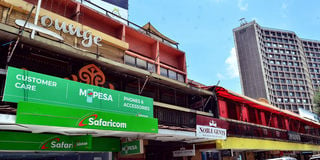
Mojos bar which closed its doors early this year.
What you need to know:
- Wamuri also notes that there is a disconnect between the entertainment join owners and current youth.
- With time, proprietors of clubs in the CBD realised that only a few people were venturing beyond their so-called locals.
Hunters, Polos, Ibiza, Wallet, Hornbill, Heartz, Verandah, Zeep, Betty’s, Psys, Zigzag, Porter House, Wine Bar and Steps, Mad House... we could go on without taking a breath but we let it stop at Mad House.
One may wonder what we are rambling about but only legends have already deciphered the trend. All these were clubs located in the Nairobi Central Business District (CBD). They no longer exist and many others are soon going belly-up. Nightlife in the Nairobi of the '90s was in the CBD. Not anymore.
“When Florida at Koinange Street closed its doors, I just knew that it was the beginning of the end for so many others. It was a personal thing for me. I remember when it was being demolished, I was there. Some people even shed tears.It was such an emotional scene,” says Mr Joseph Njoroge, popularly alias DJ Sweet Njoro.

What used to be Florida 1000 or Mad House along Koinange Street. The structure was brought down a business complex put up.
Knows what really happened
Here is a man who has lived in both the world of the '90s to the present and knows what really happened. He was actually there when Mad House was being demolished: “That day there was a huge crowd that had gathered just watching as the building was being brought down. You could just feel the sombre mood because there were people who had been going to the club for over 20 years.”
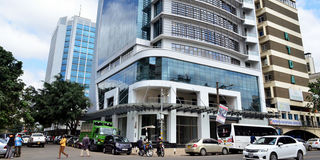
A high-rise commercial complex now stands at the corner of Koinange and Market Street where once stood the city’s most iconic club, Florida 1000 alias Mad House or F1.
Just what happened to night life in the CBD? What were the factors that dimmed the neon lights and stopped the music? What evil winds were these? Sammy Wamuri, a resident of Nairobi for more than 30 years, says that in the ‘90s, Nairobi nightlife was a tourist attraction but now things have changed.
“We used to start partying from Wednesday when ladies night was introduced, Thursday was tropical night and of course Friday set the stage for the weekend,” he said.
High crime rates
“During those times I used to live in Parklands 1st Avenue. My friends and I would walk from, where we lived, to town for a night out.” Now, he says, high crime rates have forced people to choose where to go for a night out.
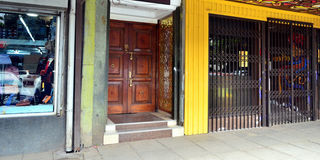
These locked doors of Clyde House located on Kimathi Street were once the entrance to Club Sylk which was located on the second floor. It was later replaced by Club Fahrenheit. Today, that space hosts Alfajiri Restaurant.
“Nightlife was a tourist attraction; the highlight of Nairobi was the nightlife. People saw the value of paying for a membership to their favourite night clubs. The nightlife was vibrant with less crime.”
Wamuri also notes that there is a disconnect twixt the entertainment join owners and current youth.
“Change of generation has also contributed to clubs shutting their doors. The new generation is different and some of these clubs have been around for decades, there is this new market that they have not yet been able to understand,” he adds. Clubs that had well established themselves suddenly started losing their spark.
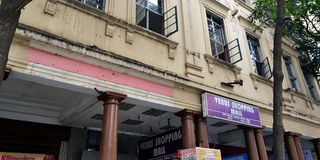
The 1st floor of the IBEA Building located on Moi Avenue was home to Club Heartz which later gave to to Lavish Lounge. Today, you can fill your stomach with food from Kilimanjaro Restaurant.
Say goodbye to nightlife
Apart from the soaring crime rates and the disconnect with the new generation, there were other factors unseen at the time, which DJ Sweet Njoro notes in retrospect: “A while back I was talking to a friend who was then a manager at Florida club, and I told him the way things were moving very soon we are going to say goodbye to nightlife in the CBD."
“Because people started investing in estates and around that time there was the advent of one man guitar shows, so the deejays did not rediscover themselves. Residential areas started opening up with various pubs and clubs being opened, resulting in revellers preferring to “drink closer home."
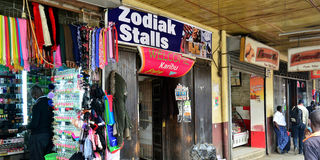
The entrance of what used to be club Pink Elephant located at Imenti House on Tom Mboya Street. Its space has since been converted into exhibition stalls.
“People invested heavily in residential clubs, so it became a matter of choosing whether to go all the way to town or just go to a pub near your estate and enjoy your tipple."
With time, proprietors of clubs in the CBD realised that only a few people were venturing beyond their so-called locals.
The main changes that hurt clubbing in the CBD? “I have been in both worlds during the ‘90s and now when clubbing was the in thing and the weekend did not end before we visited certain clubs that were popular at the time,” he offers.
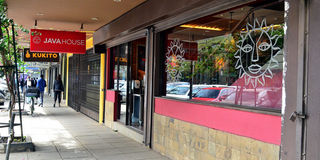
Club Riviera was located on the ground floor of Clyde House along KImathi Street which now hosts Java House.
“Kimathi Street is one of the areas that was dotted with different clubs. Today, there is barely any club on the short stretch.”
Shut their doors
Club Riviera and Gravity closed shop in 2017 to be replaced with restaurants. Tacos and Seasons shut their doors after surviving for years. But it is not just the convenience of enjoying a drink at a club in an estate that has contributed to the slow death of clubs in the CBD.
“Alcoblow was the last nail on the coffin; every time you thought about going to your favourite joint in town, the problem was where to pass through. Police had roadblocks on almost all the roads,” adds Njoroge.

The Rural Urban Credit Finance Limited building located on Tom Mboya Street where Steps Pub was located taking up the basement, ground floor and first floor. Both the basement and ground floor have now been converted into business stalls while the first floor is a restaurant.
The National Transport and Safety Authority (NTSA) introduced the use of breathalyses on the roads in 2017 to capture motorists driving under the influence of alcohol. It was the death of CBD clubbing. The DJ remembers fondly: “I relive the nineties, I remember how during the late 90s we used to start eating nyama choma probably in South B and go to a few locals there but the party never ended there.”
He would, together with a couple of his friends, later get to town to club Boomerang which was opposite club Bubbles and later sample others, in what is known as “club-hopping”.
At Bubbles, Njoro says is where Nairobians who were out and about at night would meet. “Boomerang at that time was the in thing. They had invested in a very heavy music system; of course, there were also other clubs like Lips and Florida."
Well, Florida of course.
Oldest entertainment joints
Who could forget that? “We used to start partying from Wednesday when ladies night was introduced, Thursday was tropical night and of course Friday set the stage for the weekend,” adds Wamuri.

The building that used to house Tacos along Moi Avenue and later iClub is now home to a fast-food joint.
Located on Moi Avenue, Florida 2000, or simply F2, was one of the oldest entertainment joints in the city.
However, the curtain fell on the iconic night club in 2015. Its contemporary on Koinange Street, Mad House had been shut a year earlier after 35 years of existence. “If this continues at some point there will be no clubs in the CBD, because even now the ones that are there are struggling,” Njoro takes the last word.
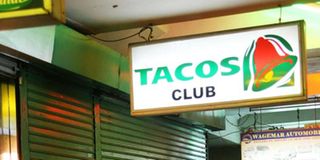
Tacos club in its heydays.
Hunters, Polos, Ibiza, Wallet, Hornbill, Heartz, Verandah, Zeep, Betty’s, Psys, Club Sound, Jungle, Tanager, Sevens, Pink Elephant, Maggies, Didos, Zanze, Zigzag, Mad House, Porter House, Wine Bar and Steps… Now we know what hit us.





